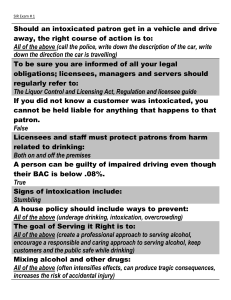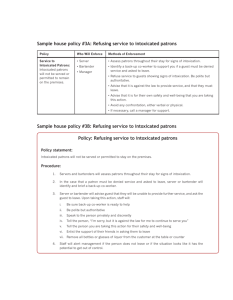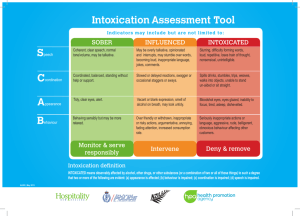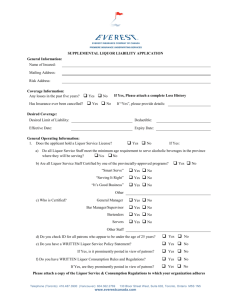Responsible Service Tip Sheet - (3052) Liability: There`s more to
advertisement
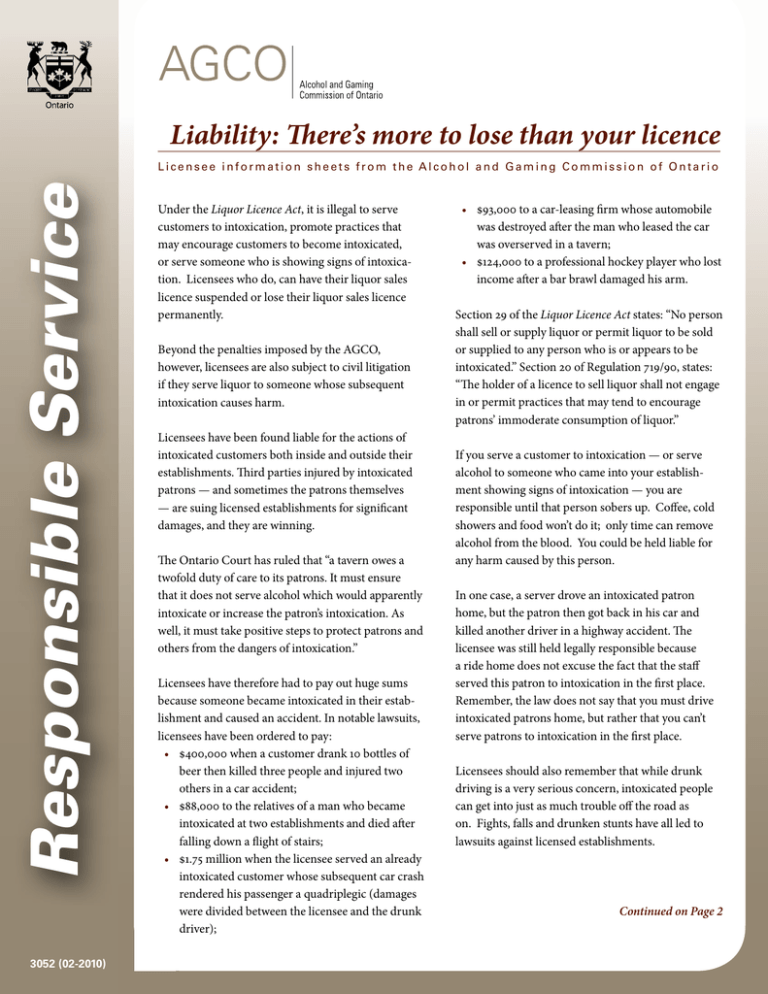
Liability: There’s more to lose than your licence Responsible Service Licensee information sheets from the Alcohol and Gaming Commission of Ontario 3052 (02-2010) Under the Liquor Licence Act, it is illegal to serve customers to intoxication, promote practices that may encourage customers to become intoxicated, or serve someone who is showing signs of intoxication. Licensees who do, can have their liquor sales licence suspended or lose their liquor sales licence permanently. Beyond the penalties imposed by the AGCO, however, licensees are also subject to civil litigation if they serve liquor to someone whose subsequent intoxication causes harm. Licensees have been found liable for the actions of intoxicated customers both inside and outside their establishments. Third parties injured by intoxicated patrons — and sometimes the patrons themselves — are suing licensed establishments for significant damages, and they are winning. The Ontario Court has ruled that “a tavern owes a twofold duty of care to its patrons. It must ensure that it does not serve alcohol which would apparently intoxicate or increase the patron’s intoxication. As well, it must take positive steps to protect patrons and others from the dangers of intoxication.” Licensees have therefore had to pay out huge sums because someone became intoxicated in their establishment and caused an accident. In notable lawsuits, licensees have been ordered to pay: • $400,000 when a customer drank 10 bottles of beer then killed three people and injured two others in a car accident; • $88,000 to the relatives of a man who became intoxicated at two establishments and died after falling down a flight of stairs; • $1.75 million when the licensee served an already intoxicated customer whose subsequent car crash rendered his passenger a quadriplegic (damages were divided between the licensee and the drunk driver); • $93,000 to a car-leasing firm whose automobile was destroyed after the man who leased the car was overserved in a tavern; • $124,000 to a professional hockey player who lost income after a bar brawl damaged his arm. Section 29 of the Liquor Licence Act states: “No person shall sell or supply liquor or permit liquor to be sold or supplied to any person who is or appears to be intoxicated.” Section 20 of Regulation 719/90, states: “The holder of a licence to sell liquor shall not engage in or permit practices that may tend to encourage patrons’ immoderate consumption of liquor.” If you serve a customer to intoxication — or serve alcohol to someone who came into your establishment showing signs of intoxication — you are responsible until that person sobers up. Coffee, cold showers and food won’t do it; only time can remove alcohol from the blood. You could be held liable for any harm caused by this person. In one case, a server drove an intoxicated patron home, but the patron then got back in his car and killed another driver in a highway accident. The licensee was still held legally responsible because a ride home does not excuse the fact that the staff served this patron to intoxication in the first place. Remember, the law does not say that you must drive intoxicated patrons home, but rather that you can’t serve patrons to intoxication in the first place. Licensees should also remember that while drunk driving is a very serious concern, intoxicated people can get into just as much trouble off the road as on. Fights, falls and drunken stunts have all led to lawsuits against licensed establishments. Continued on Page 2 Continued from p. 1 Contact number for AGCO Customer Service & General Enquiries: 416.326.8700 or 1.800.522.2876 or visit us at www.agco.on.ca Learn to protect your patrons from harm and your business from court action. Educate yourself and your staff about the responsible sale and service of alcohol. • Ensure that your staff take the mandatory Smart Serve™ responsible beverage server training program. Welltrained staff, fully aware of the effects of alcohol and the techniques for dealing with intoxicated patrons can be your best way of avoiding trouble. Call (416) 695-8737 for more information about Smart Serve or to order the program. • Develop and enforce written policies and procedures for the service of alcohol. These house policies, if properly communicated to your staff and monitored on a regular basis, may help to avoid high-risk situations. • Don’t serve patrons showing signs of intoxication. These customers get you in trouble — with the police, the AGCO and the civil courts. • Don’t serve minors. More than any other group, these inexperienced drinkers may not understand the effects of alcohol on their bodies and are most likely to drive irresponsibly and cause accidents while under the influence of alcohol. Service to minors leaves you open to both criminal and civil action. • Keep a record of incidents indicating those times when your staff refused to serve an intoxicated patron or a minor. This documentation could be used to your favour, demonstrating that you are a good operator with a history of responsible serving practices. • Employ adequate security staff to keep trouble out. In many establishments, well-trained security is essential to maintain order and head off potential problems. Security staff should carefully check ID, monitor washrooms, deter potential trouble and handle incidents as needed. • Do not promote the over-consumption of alcohol. Irresponsible promotions, such as “shooter” specials and others that encourage customers to drink alcohol more quickly than they would normally, are sure to result in a dramatic increase in cases of customer intoxication. This practice is illegal. • Offer alternative beverages. Non-alcoholic or low-alcohol drinks allow your customers to make responsible choices while visiting your establishment. Consider offering free or lower-cost non-alcoholic beverages to designated drivers. • Focus on quality, not quantity. Recognize that your business benefits when your customers moderately consume quality products sold at a higher price. • Develop a good working relationship with the police and your local enforcement inspector. They can provide you with valuable advice, and if a problem arises, you can feel comfortable calling for assistance. • Develop a checklist of potentially dangerous areas in your establishment and take action to improve them. Establishments have a duty under the Occupier’s Liability Act to ensure that the premises are reasonably safe. An unmarked step or low railing may not look dangerous in the bright light of mid-day but could be missed by a customer in a dark bar. Know the Law The Liquor Licence Act states that a licensee or a Special Occasion Permit holder may be held liable for damages if liquor is served to a person whose subsequent intoxication causes harm. Section 39 of the Act reads: The following rules apply if a person or an agent or employee of a person sells liquor to or for a person whose condition is such that the consumption of liquor would apparently intoxicate the person or increase the person’s intoxication so that he or she would be in danger of causing injury to another person or the property of another person: 1. If the person to or for whom the liquor is sold commits suicide or meets death by accident while so intoxicated, an action under Part V of the Family Law Act lies against the person who or whose employee or agent sold the liquor. 2. If the person to or for whom the liquor is sold causes injury or damage to another person or the property of another person while so intoxicated, the other person is entitled to recover an amount as compensation for the injury or damage from the person who or whose employee or agent sold the liquor.
